John Clithero
@johnclithero.bsky.social
800 followers
420 following
25 posts
Associate Professor of Marketing, Decision Making, Computational Modeling, Neuroeconomics, Consumer Neuroscience.
Posts
Media
Videos
Starter Packs
Pinned
John Clithero
@johnclithero.bsky.social
· Nov 15

Reconsidering the path for neural and physiological methods in consumer psychology
Recent decades have witnessed a burst of neuroscience research investigating mental and physiological processes central to consumer behavior, including sensory perception, memory, and decision making...
myscp.onlinelibrary.wiley.com
John Clithero
@johnclithero.bsky.social
· Apr 13

Defragmenting psychology - Nature Human Behaviour
Psychology is fragmented into the study of a myriad of constructs and measures, most of which are used very rarely. This hinders cumulative knowledge generation. We call on the field to defragment psy...
www.nature.com
John Clithero
@johnclithero.bsky.social
· Feb 15
John Clithero
@johnclithero.bsky.social
· Jan 22

Evaluating Behavioral Incentive Compatibility: Insights from Experiments
(Fall 2024) - Incentive compatibility is core to mechanism design. The success of auctions, matching algorithms, and voting systems all hinge on the ability to select incentives that make it in the in...
www.aeaweb.org
John Clithero
@johnclithero.bsky.social
· Dec 16

The affective gradient hypothesis: an affect-centered account of motivated behavior
Everyone agrees that feelings and actions are intertwined, but cannot agree how. According to dominant models, actions are directed by estimates of va…
www.sciencedirect.com
John Clithero
@johnclithero.bsky.social
· Dec 16
John Clithero
@johnclithero.bsky.social
· Nov 29
John Clithero
@johnclithero.bsky.social
· Nov 26
John Clithero
@johnclithero.bsky.social
· Nov 23

Toward an Integrative Conceptualization of Maladaptive Consumer Behavior | Journal of the Association for Consumer Research: Vol 6, No 3
Abstract Consumer research has explored several dimensions of maladaptive decision-making, including compulsive consumption and behavioral addiction. Here we propose extending this work by integrating...
www.journals.uchicago.edu
John Clithero
@johnclithero.bsky.social
· Nov 15

Supervised Machine Learning for Eliciting Individual Demand
(November 2023) - The canonical direct-elicitation approach for measuring individuals' valuations for goods is the Becker-DeGroot-Marschak procedure, which generates willingness-to-pay (WTP) values th...
www.aeaweb.org
John Clithero
@johnclithero.bsky.social
· Nov 15

Reconsidering the path for neural and physiological methods in consumer psychology
Recent decades have witnessed a burst of neuroscience research investigating mental and physiological processes central to consumer behavior, including sensory perception, memory, and decision making...
myscp.onlinelibrary.wiley.com
John Clithero
@johnclithero.bsky.social
· Nov 12
John Clithero
@johnclithero.bsky.social
· Nov 12






